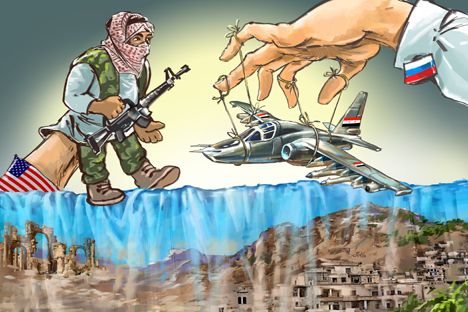
Click to enlarge the image. Drawing by Dormidont Viskarev
If anyone had any hopes that Russian-American relations would somehow improve after Russian President Vladimir Putin's recent meeting with his U.S. counterpart Barack Obama in New York, it is safe to say that now they can be forgotten. And even if Moscow's military intervention in Syria did slightly change the agenda with Washington toward a decrease of "toxicity" concerning Ukraine, it still has not helped to build cooperation – even when it comes to the crucial issue of fighting terrorism represented by the Islamic State (ISIS) radical militant group. The disagreements between Russia and the U.S. over Syria's future have turned out to be too great.
Washington has perceived Moscow's actions in the fight against various terrorist and Islamist groups in Syria (not only ISIS but also groups such as Jabhat al-Nusram, which essentially is an Al-Qaeda branch) not only as excessive autonomy, but also as a challenge to U.S. policy in the region. And all this despite the fact that not only has the broad international coalition's months-long bombardment of ISIS forces not achieved any serious results, but on the contrary, the group has increased the territory under its control. Mass media have begun saying that Obama has handed the advantage to Putin, something that obviously has only worsened the emotional background for improving dialogue, especially since personal relations between the two presidents have never been marked by amicability.
If in the first days of the Russian bombardments in Syria the U.S. administration was still making statements that could have been interpreted as relatively positive, now it is only voicing criticism and condemnation: The Russians are bombing the wrong formations, they're playing their own game in Syria and their main objective is not fighting ISIS but helping the regime of Syrian leader Bashar al-Assad. There is no more discourse about how Assad could play a role in the transition of power. The U.S. refuses to have any consultations with Russia on issues of political regulation in Syria. Moscow's proposals to hold high-level talks with the participation of Russian Prime Minister Dmitry Medvedev (who actually had decent relations with Obama) have been refused.
The only thing Washington is willing to do is hold talks between the countries' militaries in order to prevent any accidental combat collisions in Syria's airspace. After three videoconferences, both Russia's Defense Ministry and the Pentagon are speaking about the convergence of positions on key issues for the preparation of a memorandum of understanding on flight safety over Syria.
Will such contacts lead to talks on political issues? In the near future, obviously no. America does not want to discuss with Russia its support for the so-called "moderate opposition" or even explain which groups, besides the semi-mythical Free Syrian Army (FSA), which is divided into tens of motley brigades, it considers moderate. Furthermore, with the failure of the $500-million program that prepared "moderate" fighters on location, the Pentagon has started sending massive weapons supplies to Assad's enemies to combat him from the air.
But there is no guarantee that these weapons will not end up in the hands of ISIS or other "moderate" terrorists. This has already happened with a shipment of off-road Toyotas that had originally been sent to the FSA but wound up with ISIS – a scandal that flew around the internet. It seems that the U.S. is gambling on a decisive change in the battlefield, one that favors a broad coalition of anti-Assad forces proclaimed as moderate. And then, if necessary, the U.S. will start negotiations. Especially since, with the support of Russia's air force, Syria’s government troops are now in a more offensive position, which obviously Washington would like to prevent.
In Syria the different groups are constantly forming and reforming alliances, including ISIS, and fighters migrate from one alliance to another – together with their weapons. In Hama province there is an army with several dozens of thousands of fighters that includes terrorist groups such as Jabhat al-Nusram, Ahrar ash-Sham and others. Now there is the risk that they will receive, even if indirectly, through third parties, American arms. At least for now, we are not talking about antiaircraft systems.
America's refusal to coordinate its distribution of weapons from the air onto regions occupied by Islamist groups means it is creating the prerequisites for starting a proxy war between Damascus, with its Russian support, and terrorists. This threatens to further worsen relations between Russia and America on all the other issues, to the point of the U.S. considering the introduction of new sanctions against Russia – now for its involvement in Syria. The fact that Washington has momentarily diverted its attention away from Ukraine and the strengthening of NATO forces in Eastern Europe is meaningless. The main battle has shifted to the Syrian desert.
For now this still cannot be called a confrontation in the form of a proxy war. It seems the U.S. believes the Russian campaign and Assad's worn-out army, which has been fighting a four-year war, will fizzle out. Islamist sites are already showing how American missiles are burning Assad's tanks in the provinces of Hama and Idlib. This is not the coordination on Syria that the Kremlin would like from the U.S. Also, Washington’s refusal to engage in political talks on Syria's future can be interpreted by Moscow as a challenge, one that will result in Russia strengthening its alliance with Iran, which is also set on supporting Damascus with military force.
The author is a political analyst and member of the Council on Foreign and Defense Policy, an independent Moscow-based think tank.
All rights reserved by Rossiyskaya Gazeta.
Subscribe
to our newsletter!
Get the week's best stories straight to your inbox